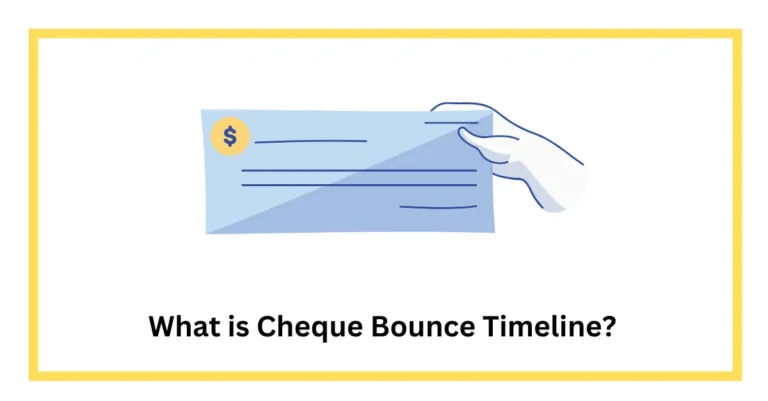To address these conflicts in a more efficient and harmonious manner, cheque bounce mediation and arbitration have emerged as effective alternative dispute resolution methods.
In today’s fast-paced economic landscape, financial transactions play a pivotal role in business and personal interactions. One common form of financial exchange is the issuance of cheques, which serve as a promise of payment. However, instances of cheque bounce, where a cheque is not honored due to insufficient funds or other reasons, can lead to disputes and strained relationships. To address these conflicts in a more efficient and harmonious manner, cheque bounce mediation and arbitration have emerged as effective alternative dispute resolution methods.
Understanding Cheque Bounce: Legal Implications
A cheque, as a negotiable instrument, holds a legal significance that binds parties involved in a transaction. When a cheque is dishonored, it not only raises financial concerns but also legal repercussions.
The Negotiable Instruments Act, 1881, in many jurisdictions, defines the legal framework around cheques and their dishonor. In such cases, the payee or the holder of the bounced cheque can initiate legal proceedings to recover the due amount.
The Role of Mediation in Cheque Bounce Cases
Mediation, a voluntary and non-adversarial process, has gained traction as an effective method to resolve cheque bounce disputes. Mediation involves a neutral third party, the mediator, who facilitates communication between the parties involved. Unlike traditional litigation, mediation focuses on collaboration rather than confrontation.
Confidentiality and Preservation of Relationships
One of the notable advantages of mediation in cheque bounce cases is its emphasis on confidentiality. Confidentiality allows parties to openly discuss their concerns without the fear of damaging their reputation. This is especially crucial in maintaining business relationships, as disputes can often strain partnerships.
Cost and Time Efficiency
Court battles can be expensive due to legal fees and lengthy proceedings. Mediation, on the other hand, typically involves fewer costs and is usually resolved more swiftly, allowing parties to move forward promptly.
Flexibility in Crafting Solutions
Mediation provides a flexible environment for crafting solutions. Parties have the autonomy to design agreements that suit their unique circumstances, fostering a sense of ownership over the resolution. This flexibility can lead to more sustainable outcomes.
Arbitration as a Resolution Mechanism
Arbitration, while more structured than mediation, provides an alternative to litigation that offers several benefits in cheque bounce cases.
Expertise of Arbitrators
Arbitration allows parties to select arbitrators with expertise in financial matters, ensuring that the disputes are resolved by professionals who understand the intricacies of cheque transactions.
Formal Yet Expedited Process
Arbitration follows a formal procedure, resembling a simplified version of a court trial. However, the arbitration process is generally quicker than traditional litigation, providing a swift resolution to the dispute.
Binding Nature of Awards
Unlike mediation, where the outcome is not binding unless an agreement is reached, arbitration awards are legally binding and enforceable. This aspect ensures that the parties involved comply with the decision rendered by the arbitrator.
Comparing Mediation and Arbitration
While both mediation and arbitration offer alternatives to litigation, they have distinct characteristics that make them suitable for different scenarios.
Collaboration vs. Decision-Making
Mediation’s strength lies in its collaborative approach, where parties actively participate in reaching a resolution. In contrast, arbitration involves a third-party arbitrator who makes a decision after hearing both sides. This can be advantageous when parties are unable to agree through negotiation.
Preservation of Relationships vs. Binding Decisions
Mediation’s focus on communication and understanding can help preserve relationships between parties, which is especially significant in business contexts. Arbitration, with its binding decisions, might be preferable when parties want a final resolution without further negotiation.
New Cheque Bounce Rule
The Reserve Bank of India (RBI) issued a noteworthy notice in early August 2021, introducing a new set of rules regarding cheque bounce incidents. This move aims to streamline financial activities for customers who rely on cheques and those planning to use them. Here’s a breakdown of the key changes and how they impact you.
Cheque Bounce Scenario in India: Understanding the Changes
Minimum Balance Requirement: Customers whose transactions heavily revolve around cheques must maintain a minimum bank balance. Failure to do so can result in a cheque bounce case. Moreover, the customer issuing the cheque may face a penalty fee.
NACH Operational Hours: The National Automated Clearing House (NACH) is now operational 24 hours a day. This move facilitates smoother transactions and cheque processing.
Circumstances of Cheque Bounce
Several scenarios may result in a cheque bouncing:
Insufficient Account Balance: If the drawer’s account lacks funds to cover the cheque, the bank will return it due to insufficient funds.
Expired Cheque: Cheques must be presented for payment within three months. If not, they expire, leading to a bounced cheque if submitted.
Overwriting: Any overwriting on the cheque, be it the signature, amount, or other details, can lead to a bounced cheque.
Damaged Cheque: A cheque with obscured details, damage, or stains that make the information unreadable will bounce.
Signature Mismatch: A cheque bounces if the signature on it doesn’t match the bank’s records.
Mismatch of Amounts: If the cheque amount in words and figures differs, the cheque may bounce.
Remedies Against Cheque Bounce
Should a cheque bounce occur, consider the following remedies:
Resubmission: For scenarios like overwriting, damaged cheques, or signature mismatches, ask the drawer to submit a corrected cheque.
Cheque Bounce Notice (Section 138): When a cheque bounces due to insufficient funds, issue a written cheque bounce notice. You can initiate legal action if the issue isn’t resolved within 15 days.
Legal Action: If the drawer fails to rectify the issue within 15 days from the notice, initiate legal action against him. Remember, a cheque bounce notice can’t be issued for non-enforceable obligations.
How to Respond to a Cheque Bounce Case
To respond effectively:
Consult a Legal Practitioner: Seek advice from a legal expert in cheque bounce cases before responding.
Address the Notice: Craft your response, addressing it to the drawer’s lawyer. Include your name, address, and accurate details of the issue.
Defend or Settle: Lay out the facts and your defence or intention to settle. Avoid admissions and consult your lawyer to ensure a proper format.
Remember, prompt action and consultation with legal professionals like the experts at Vakilsearch are crucial when dealing with cheque bounce cases. Failure to respond within 15 days can lead to further legal proceedings.
Conclusion
In the realm of financial disputes arising from cheque bounce cases, mediation and arbitration present effective means of resolving conflicts without resorting to the traditional, often adversarial, court processes. These alternative methods prioritize collaboration, efficiency, and tailored solutions, making them valuable tools for individuals and businesses alike. As financial transactions continue to shape our interconnected world, embracing these alternative dispute resolution mechanisms can lead to swifter resolutions, cost savings, and the preservation of valuable relationships.
Frequently Asked Questions
What is the scenario of a cheque bounce?
When a cheque is bounced for insufficient funds in the bank account, it is a criminal offence, and the payee can file a criminal complaint under Section 138 of the Negotiable Instruments Act, of 1881.
What is the rule of cheque bounce in India?
Cheque bouncing is a criminal offence in India, and the punishment can be fine which can extend to twice the amount of the cheque or imprisonment for a term not more than two years or both.
What is the new rule for bounced cheques?
The Reserve Bank of India (RBI) has issued a circular that mandates the clearance of cheques within 24 hours of production in the banks. Previously, weekends and gazetted holidays were skipped, which affected businesses and employees who had to wait for their salaries if the month-end accompanied a weekend. People who draw cheques in advance hoping to add sufficient funds to their accounts later should be aware of the 24-hour clearing system before drawing a cheque.
How many cheque bounce cases are there in India?
The number of cheque bounce cases in India cannot be quantified. To get an estimate, you can always reach out to our experts!
What is the key difference between arbitration and mediation in a cheque bounce case?
The key difference between arbitration and mediation is that arbitration is a binding process, while mediation is a non-binding process. In arbitration, the arbitrator makes a decision that is binding on the parties. In mediation, the mediator helps the parties to reach a mutually agreeable settlement, but the parties are not obligated to accept the mediator's suggestions.
How does Section 138 of the arbitration Act relate to cheque bounce cases?
Section 138 of the Arbitration and Conciliation Act, 1996, provides that any dispute arising out of a cheque bounce can be referred to arbitration. This means that if you and the other party agree to arbitrate your dispute, you can avoid going to court.
Can you explain the mediation process within the context of arbitration for cheque bounce disputes?
Irrespective of the reasons of dishonored Cheque , Mediation can be used as a first step in arbitration to try to resolve the dispute without the need for a formal hearing. If the parties are unable to reach a settlement through mediation, the arbitrator will then hold a hearing and make a decision.
What are the legal steps to fight a cheque bounce case effectively?
To effectively address a cheque bounce case, the following legal steps should be taken. Send a demand notice to the cheque drawer, specifying the cheque amount, dishonour date, and reasons, allowing a 15-day window for payment If payment isn't made within this period, proceed to the next step File a complaint under Section 138 of the Negotiable Instruments Act, 1881, with the Magistrate's Court Gather supportive evidence for the court, including the cheque, demand notice, and relevant documents Present your case before the Magistrate, demonstrating that the dishonour resulted from insufficient funds If convinced, the Magistrate may order the drawer to repay the due amount, including interest and costs.
Are there any recent rule changes regarding cheque bounce cases?
Yes, the Negotiable Instruments (Amendment) Act, 2018, has increased the minimum imprisonment term for individuals convicted of cheque bounce from six months to two years.
What are the maximum court fees one might have to pay when pursuing a cheque bounce case?
The maximum court fees that you may have to pay when pursuing a cheque bounce case will depend on the amount of the cheque. However, the court fees are typically very low.
How does Rule 18 of arbitration rules affect arbitration in cheque bounce cases?
Rule 18 of the Arbitration and Conciliation (Procedure) Rules, 2016, provides that the arbitrator shall make an award within 12 months from the date of commencement of the arbitration proceedings. This rule is intended to ensure that cheque bounce cases are resolved quickly and efficiently.
Can you explain the significance of Sections 23, 24, and 31 in arbitration related to cheque bounces?
Sections 23, 24, and 31 of the Arbitration and Conciliation Act, 1996, address the authority of the arbitrator, the formulation of the arbitral award, and the circumstances under which an arbitral award can be invalidated, respectively. Section 23 confers upon the arbitrator the authority to perform all actions necessary for the arbitration proceedings, which encompasses summoning witnesses, scrutinising evidence, and demanding document submission. Section 24 stipulates that the arbitral award must be in written form, bearing the arbitrator's signature, and should elucidate the rationale behind the decision. Meanwhile, Section 31 specifies that the court can annul an arbitral award only on specific grounds, such as fraud, coercion, or arbitrator bias.
What is the minimum imprisonment term for individuals involved in cheque bounce cases?
The minimum imprisonment term for individuals convicted of cheque bounce is two years. However, the court may impose a lesser sentence, or even no sentence at all, if there are extenuating circumstances.
Is it possible to win a cheque bounce case through arbitration or mediation, and how does one go about it?
Yes, it is possible to win a cheque bounce case through arbitration or mediation. The key is to have a strong case









